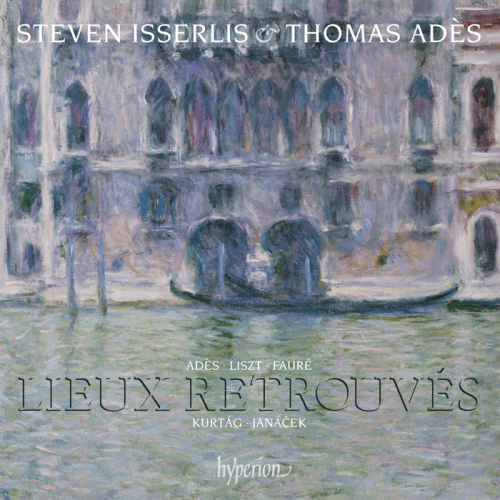
Steven Isserlis, Thomas Adès - Lieux retrouvés (2012)
BAND/ARTIST: Steven Isserlis, Thomas Adès
- Title: Lieux retrouvés
- Year Of Release: 2012
- Label: Hyperion
- Genre: Classical
- Quality: FLAC (image+.cue,log,scans)
- Total Time: 76:44
- Total Size: 263 Mb
- WebSite: Album Preview
Tracklist:
Franz Liszt (1811-1886)
[1] Romance oubliée, S 132 (1880)
[2] Die Zelle in Nonnenwerth, S 382 (?1883)
[3] Die Trauergondel (La lugubre gondola), S 134 (1882-5)
Leoš Janáček (1854-1928)
[4]-[6] Pohádka (A Tale) (1910, revised 1923)
Gabriel Fauré (1845-1924)
[7]-[9] Cello Sonata No.2 in G minor, Op.117 (1921)
György Kurtág (b.1926)
[10] For Steven: In Memoriam Pauline Mara (2010) solo cello
[11] Pilinszky János: Gérard de Nerval (1984) solo cello
[12] Schatten (1999) solo cello
[13] György Kroó in memoriam (1997) solo cello
Thomas Adès (b.1971)
[14]-[17] Lieux retrouvés (2009)
Performers:
Steven Isserlis, cello
Thomas Adès, piano
Franz Liszt (1811-1886)
[1] Romance oubliée, S 132 (1880)
[2] Die Zelle in Nonnenwerth, S 382 (?1883)
[3] Die Trauergondel (La lugubre gondola), S 134 (1882-5)
Leoš Janáček (1854-1928)
[4]-[6] Pohádka (A Tale) (1910, revised 1923)
Gabriel Fauré (1845-1924)
[7]-[9] Cello Sonata No.2 in G minor, Op.117 (1921)
György Kurtág (b.1926)
[10] For Steven: In Memoriam Pauline Mara (2010) solo cello
[11] Pilinszky János: Gérard de Nerval (1984) solo cello
[12] Schatten (1999) solo cello
[13] György Kroó in memoriam (1997) solo cello
Thomas Adès (b.1971)
[14]-[17] Lieux retrouvés (2009)
Performers:
Steven Isserlis, cello
Thomas Adès, piano
The coherence of the program on this release by the increasingly popular British cellist Steven Isserlis may not be evident at first glance, but it's a nifty idea, and one with a weight that not so many contemporary composers can comfortably support. What Franz Liszt, Leos Janácek, Gabriel Fauré, and György Kurtág have in common is that they all influenced the last composer on the program, Thomas Adès. This gives you an idea of Adès' eclecticism, which is brought into relief when you hear the strands of music that he likes. Those strands might broadly be characterized as minimal (to which category belong the three experimental pieces by Liszt, who proclaimed that he was going to "hurl his lance into the infinite sphere of the future," and the evanescent solo cello pieces by Kurtág), lyrical (Fauré), and what one might call magical-psychological (Janacék). Put those together, especially with much of the music loosely related around themes of memory and nostalgia, and you have a pretty good summary of Adès' Lieux retrouvés (Places Rediscovered). Adès throws in music from other sources as well, notably jazz, but his luxuriant yet inward style gains greatly in definition from this context, and his own accompaniment on piano shows his involvement (and betrays no technical stress). Isserlis himself seems a bit more comfortable with the edgier music than with Fauré, but his presentation here is a model for other performers wishing to incorporate contemporary music into solo recitals.
Classical | FLAC / APE | CD-Rip
As a ISRA.CLOUD's PREMIUM member you will have the following benefits:
- Unlimited high speed downloads
- Download directly without waiting time
- Unlimited parallel downloads
- Support for download accelerators
- No advertising
- Resume broken downloads


